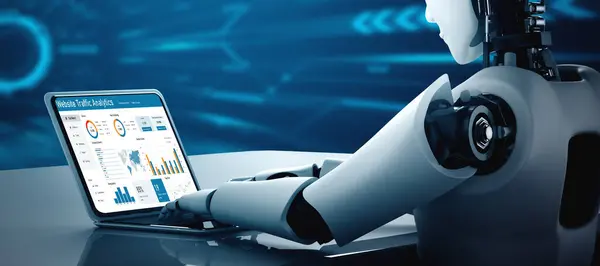SEO has forever been a blend of science and art. However, with the advent of AI, it seems less like guesswork and more like precision engineering. In 2025, you are playing it wrong if you are still doing manual SEO. Here is a breakdown of why AI-based SEO services are quicker, more intelligent, incisive, and more in sync with contemporary search algorithms.

The Unmatched Speed and Scale of AI
Keyword lists, SERP evaluation, and site health audits can take hours of manual digging. However, AI-powered SEO services can perform these operations in seconds. They consider hundreds of ranking signals, analyze competitor data in bulk, and provide insights that would require your team weeks, if not months, to compile. The sustained focus and scalability to do repetitive, data-intensive work without getting tired is a massive boost for AI SEO services. AI can crawl thousands of web pages, audit metadata, check Core Web Vitals, and analyze backlinks while a human might take hours to explore a single landing page.
Smarter Keyword Strategy
Keyword research is about intent, not volume. AI SEO platforms are now trying to understand the search intent associated with the keywords, grouping them into meaningful topic clusters and matching them with your funnel stages. The nuance is often lost in manual approaches. AI tools incorporate historical trends, predictive analytics, and semantic search, making it easier to rank for your audience’s desires. They can even suggest potential keyword opportunities that competitors haven’t targeted yet.
Content That’s Built to Rank
Writing content by hand takes time and is often shaped by preconceptions or bad habits you learned about 10 years ago. AI tools look at pages that rank well, spot trends in architecture, style, and keyword usage, and feed this information into creating optimized content outlines or even full drafts. So you have a proven blueprint as a foundation, rather than your gut feelings. Together, backed by human creativity, they deliver content faster and optimize it for performance.
Frameworks for AI-generated content can be customized by specific content types, such as product descriptions and blog posts, to keep your SEO efforts consistent throughout your site.
Real-Time SEO Adjustments
Search engine algorithms change all the time. In a manual setup, teams often react weeks after the event itself. When the changes happen, the AI platform resumes crawling data. It starts by finding the data per digital footprint to find the features adaptive to the crawled digital footprint as part of rankings, crawling behavior, and competitive movements. They will notify you of decreases in visibility, mark technical problems, and even propose ad hoc adjustments to stay ahead. It is as if you have a sleep-deprived SEO analyst on duty 24/7.
Smarter Link Building
Creating manual backlinks can be slow, ineffectively scattered, and heavy. Find high domain authority prospects, analyse link quality, generate auto-drafted outreach emails – all with the help of AI. Although the human element is still the core of outreach, AI makes it faster for you to build a list and never skip the most valuable sites. Products sometimes offer campaign tracking, so you’re not shooting in the dark; you can tweak as you go!
Enhancing User Experience
SEO is not just about pleasing Google but also about satisfying users. AI tools today assess the user behavior signals such as:
- Scroll depth
- Click-through rates
- Dwell time
They reveal friction points on your site, recommend changes to the layout, and surface insights that most manual reviews tend to overlook. In turn, they improve search rankings and bounce rates.
More Precise Technical Audits
As vast and outdated as it is, manual audits help avoid the big mistakes: broken links, slow pages, and bad redirects. AI finds the things you didn’t even know you were supposed to look for, like crawl anomalies, JavaScript rendering issues, hidden duplicate content, etc, that may negatively affect your website ranking. It can even give out severity scores, so your team knows where to begin. This level of detail results in cleaner sites, improved indexing, and fewer SEO headaches.
SEO Prediction and Forecasting
Advanced AI tools can predict and analyze. They can help predict how well your content will perform, what kind of additional traffic you can get from targeting the right keywords, and what to publish next (based on rising search trends). Manual processes alone do not lend themselves to that level of foresight.

This prediction also aids in budgeting and resource allocation. Tracking upcoming trends through keyword or topic studies allows a marketing team to move early on SERP positions and begin taking advantage of simmering interest before competitors get the memo.
Efficiency = Lower Costs, Higher ROI
With machines doing the heavy lifting, your team spends less time on manual tasks and more on the strategy. Fewer hours are billed, project delivery is faster, and output is higher with fewer people. Even without considering the increased revenue you generate from higher positions in the SERPs, AI SEO services often pay for themselves in improved productivity alone.
The Human Element Is Still Important
AI is powerful but not perfect. You still need human judgment to:
- Set SEO goals
- Define brand voice
- Interpret data with context
- Make creative decisions
The secret ingredient isn’t just AI or human touch; it’s the combination. Use machines for scale, and have your team handle the creative storytelling and brand nuance.
Final Thoughts
The fact is that AI-powered SEO services outdo manual tactics by doing what humans simply can’t: analyzing at scale, adapting in real time, and surfacing insights instantly. That doesn’t mean humans are redundant. But it also doesn’t mean that top SEO teams do everything by hand. They use AI to work smarter, faster, and deliver better outcomes. So, if you’re still all-in on manual, you’re losing significant ground and time. To put it bluntly, continuing to stay manual will be like building with a hammer when you could use a power tool to move ahead of the competition.
About the Author
Martin Brown is a business professional who is always looking for new opportunities and likes to share his knowledge with others in the field. He has been working in the industry for over 10 years and has a deep understanding of what it takes to succeed. Create. Cultivate. Consume. Learn. Explore.

Leave a Reply